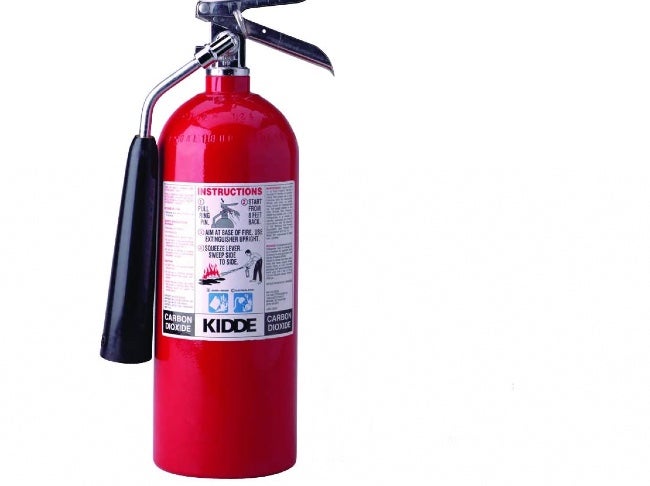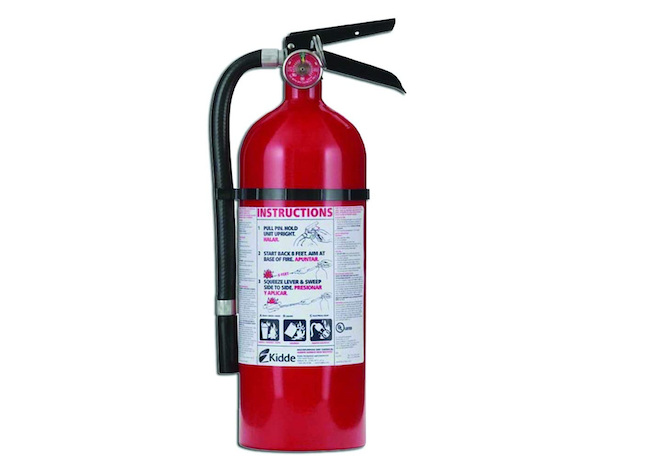While a fire extinguisher may be an essential piece of safety equipment to have at the home or workplace, not all fire extinguishers are the same. Understanding how each type works is crucial to choosing the right one.
Fire extinguishers work by removing one or more of the three requirements for fire—heat, oxygen and fuel. Removing one of these elements of what’s known as the “fire triangle” will extinguish a burning fire. Fire extinguishers are rated by their ability to put out the four different classes of fire—A, B, C, and K.
Class A fires include combustible materials such as wood and paper, Class B fires involve flammable liquids such as solvents and gasoline, Class C fires involve energized electrical equipment, while Class K fires consist of combustible cooking oils and grease typically found in a commercial kitchen. To meet these different classes, fire extinguishers come in a broad range of types that use water, dry chemicals, wet chemicals, and even gas. Below, learn about the different types of fire extinguishers so you can choose the right fire extinguisher for your home.

1. Water
Good old-fashioned water is still one of the best ways to put out certain types of fire. Water fire extinguishers fall under the Class A category of fire extinguishers, which means they’re suitable for use on ordinary materials such as cloth, paper, wood, rubber, and most plastics. In addition to water, some water fire extinguishers also contain wetting agents that reduce the surface tension in water molecules to make them more effective at dousing flames.
While a water fire extinguisher is effective on combustible solids, it can be dangerous to use on other types of fire. Never use a water fire extinguisher on an electrical fire (Class C), which can cause you to electrocute yourself. Using a water fire extinguisher on fire caused by a flammable liquid, such as oil or gasoline (Class B), can cause the fire to flare and spread. Since water solidifies in sub-freezing temperatures, water-based fire extinguishers are not a good choice for use in extreme cold unless the water includes antifreeze.
Best For: A water fire extinguisher is a good safety device to have on hand for backyard fire pits, campfires, charcoal grills, and other applications in which the combustible material falls under Class A.
When it comes to water-fire extinguishers, volume and range are crucial, and this model offers plenty of both with a 2.5-gallon capacity, 55-second discharge time, and 55-foot range.

2. AFFF
AFFF (aqueous film-forming foam) fire extinguishers work for both Class A and Class B fires. That means that in addition to extinguishing such combustible materials as wood, clothing, paper, rubber, and plastic, this type of fire extinguisher will also work on flammable liquids, such as petroleum, solvents, alcohols, and flammable gases. This type of fire extinguisher discharges foam as opposed to a liquid, extinguishing the fire by depriving it of oxygen.
One of the advantages of an AFFF fire extinguisher is the foam’s ability to float on the surface of liquids, allowing it to both extinguish a flammable liquid and prevent it from reigniting. Since AFFF fire extinguishers can freeze, they are not suitable for use in frigid temperatures.
Best For: With its Class B rating, foam fire extinguishers are the best choice for outfitting kitchens, which are prone to grease fires.
With its Class A, B, and C rating, this fire extinguisher can handle nearly all types of fires one might encounter in the home.

3. Carbon dioxide (CO2)
This type of fire extinguisher uses a gas cloud to extinguish a fire by removing the oxygen in the air around it, as opposed to other types that use water, foam, or a dry substance. As a result, it doesn’t leave any residue behind. This makes it ideal for situations where water or foam can damage sensitive electrical equipment.
The downside of a CO2 extinguisher is that it has a relatively short range of between 3 and 8 feet, depending on the size of the unit. Since this fire extinguisher is gas-based, it’s not intended for use outdoors or in indoor locations with high airflow. Windy conditions can dissipate the extinguisher’s reagent, inhibiting its ability to put out a fire. Also keep in mind that this fire extinguisher is not rated for extinguishing burning wood, paper, or other materials that fall under Class A fires.
Best For: A CO2 fire extinguisher is best used in situations where other types of fire extinguishers can damage electrical equipment.
With its environmentally safe CO2 formula, this fire extinguisher is ideal for locations with electronics and other valuable materials water can damage.

amazon.com
4. ABC powder
ABC powder is the only dry chemical agent classified as a Class A fire extinguisher. It uses mono ammonium phosphate, a yellow powder that melts into a sticky molten substance when it reaches a temperature of about 350 degrees Fahrenheit. Nitrogen gas is used to propel the solid out of the extinguisher at a range of about 15 feet. This substance sticks to burning embers, blocking out oxygen and extinguishing them.
Since they interrupt the chemical reaction that causes a fire, ABC powder fire extinguishers are extremely effective against Class A, B, and C fires. For this reason, they’re most commonly used in labs and industrial settings. The downside of this fire extinguisher type is that it creates a huge mess.
Best For: Effective but messy, ABC powder fire extinguishers are best suited for commercial and industrial settings.
This fire extinguisher is highly effective at suppressing and extinguishing Class A, B, and C fires but leaves a large mess behind.

5. Deionized water mist
A water mist fire extinguisher releases deionized water in a fine mist that produces water droplets so small they can deprive a fire of oxygen while leaving the area mostly dry. This makes them the best option for areas with electronics, books, or other valuable items that would be damaged by a water fire extinguisher.
And, since the water is deionized, meaning it cannot conduct electricity, this water-based type of fire extinguisher can be used on both Class A and Class C fires.
Best For: With its ability to extinguish Class A and C fires without soaking the area or leaving a residue, this type of fire extinguisher is ideal for places with books and sensitive electronics.
This large capacity mist fire extinguisher has a long discharge time of 72 seconds and range of up to 12 feet.

6. Wet chemical
Wet chemical fire extinguishers attack the flames by removing two of the fire triangle’s three parts—heat and oxygen. Wet chemical fire extinguishers, which are also referred to as Class K extinguishers, use wet potassium acetate to create a cooling effect while also suffocating the fire. This makes them extremely effective at putting out high temperature grease fires that sometimes occur in commercial kitchens. Wet chem. fire extinguishers have a range of about 12 feet and last for about 40 seconds before running out.
Best For: With their superior ability to put out grease fires, this type of fire extinguisher is typically found in commercial kitchens.

